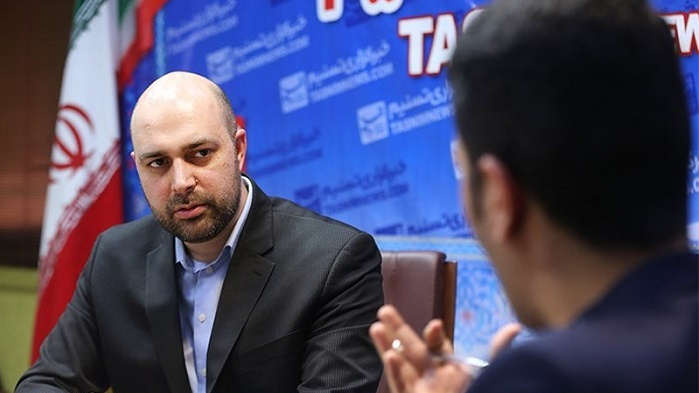The Latest Casualty of Anti-Dual Citizenship Campaign in Iran May Surprise You

(Picture: Rouhollah Rahmani in an interview with Tasnim news agency.)
“There is not a single official who holds dual citizenship” said Iran’s Minister of Intelligence Mahmoud Alavi on November 1, 2016, on the sidelines of a conference in Tehran.
Article 98 of the law on public service clearly states that withdrawal from Iranian citizenship, or acquiring citizenship of a foreign country will naturally render ineligible a person to enter public service. Nonetheless, as many observers have correctly mentioned, this law is hardly exercised. Even in comments part of which was quoted above, the Minister of Intelligence Mahmoud Alavi has restricted the application of the law to ministers, deputy ministers, parliamentary legislators, and director generals. Interestingly, even Article 98 seems to stand at odds with the constitution, whose Article 41 reads as such: “Citizenship of Iran is the indisputable right of every Iranian, and the government cannot take this right away unless the person requests it or if he becomes the citizen of another nation”; that is, one cannot acquire citizenship of another country and still hold on to their Iranian nationality and its entitlements.
Dual citizenship has become a sensitive issue since the presidency of Hassan Rouhani, particularly after a nuclear deal, the Joint Comprehensive Plan of Action (JCPOA), was signed between Iran and the six global powers, under which Iran was promised relief from sanctions in return for shelving the bigger part of its nuclear program. Despite hurdles, the deal is seen as a milestone in reconnecting the country to the global economy and increasing cultural and social transactions. Such a prospect has aggravated suspicious among hardliners about the existence of a larger, secret plan to infiltrate the Islamic Republic decision-making centers and undermine its foundations; hence several cases of arrests of entrepreneurs, academic figures and journalists during the last couple of years on security charges. In their coverage of these cases, hardliner media have always highlighted their dual citizenship, and their role as Trojan horses sent by the West. When Abdol-Rasoul Dorri Esfahani, an advisor for the nuclear negotiators of Iran on banking sanctions, was detained in late August on charges of espionage this summer, hardliner media were quick to address his dual citizenship.
Mahmoud Khavari, former CEO of Iran’s largest bank, the Melli Bank, can boast to be one of those who filled the term dual citizenship with this amount of notoriety. Khavari was a key culprit in the notorious 2.6-billion-dollar embezzlement scandal of 2011, the gravest case of fiscal corruption at its time which rocked the Iranian society. Khavari fled to Canada, taking refuge in his posh mansion in Bridle Path, Toronto, before being arrested by officials. Khavari was a dual Iranian-Canadian citizen, and he has not been extradited to Iran despite frequent requests by judiciary officials.
One senior Principlist analyst, Mohammad-Sadegh Koushki, called dual citizenship a “security loophole” following Khavari’s escape, criticizing non-enactment of the letter of constitution which categorically rejects dual citizenship.
Controversies over citizenship and nationality take place in various forms, and are not excluded to dual citizenship. Mohammad Nahavandian, Hassan Rouhani’s chief of staff, made headlines in 2005 when he traveled to Philadelphia, United States, using his Green Card. His entitlement to frequent the United States, despite restrictions against movement of Iranian officials inside the country, raised concern even by then Secretary of State Condoleezza Rice. Alavi, Minister of Intelligence, praised Nahavandian in his recent interview with official news agency of IRNA for his “nobility” and refusal to apply for a US citizenship despite being legally entitled to do so.
There are earlier precedents: in 1999, imminent appointment of Mahmoud Hashemi Shahroudi by Supreme Leader Ayatollah Khamenei as chief magistrate had raised questions. Not only was Hashemi Shahroudi born in the Iraqi city of Najaf, but also he had been a founder and key figure of the Islamic Supreme Council of Iraq, a revolutionary body established in 1981 in Iran with the aim to overthrow the Iraqi tyrant Saddam Hussein. Only a few months after the Islamic Revolution, Jalaleddin Farsi, a politician close to Akbar Hashemi Rafsanjani and Ayatollah Ali Khamenei, was barred from running for the first presidential election, despite his high hopes, after his rivals revealed that despite the caveats set in the constitution, he was not of Iranian origin: his father was an immigrant from the city of Herat in Afghanistan.
The latest victim of this anti-dual citizenship campaign, however, comes from an unexpected background. Rouhollah Rahmani, who recently stepped down as director general of telecom ministry’s bureau of innovation, is son-in-law of Gholam-Ali Haddad Adel, three-times MP from Tehran, speaker of the 7th parliament and an influential figure in the Principlist camp. Rahmani had to leave office for being a natural-born US citizen, though born to Iranian parents he also holds Iranian citizenship.
Alavi, Minister of Intelligence, indirectly mentioned the case of Rahmani, an artificial intelligence PhD graduate and –based on his own remarks, with a record of working for both Microsoft and Amazon. Minister of Intelligence described him as “educated”, “pious”, “relative of a well-known, dear political figure of the country” (that is, Haddad Adel), conditions which seem more than enough to secure a senior executive position in Iran. Alavi implicitly lamented the fact that Rahmani had to resign because of the citizenship laws. “Some speak of dual citizenship as if every dual citizen is corrupt, alien, traitor to the country or a spy” he complained.

